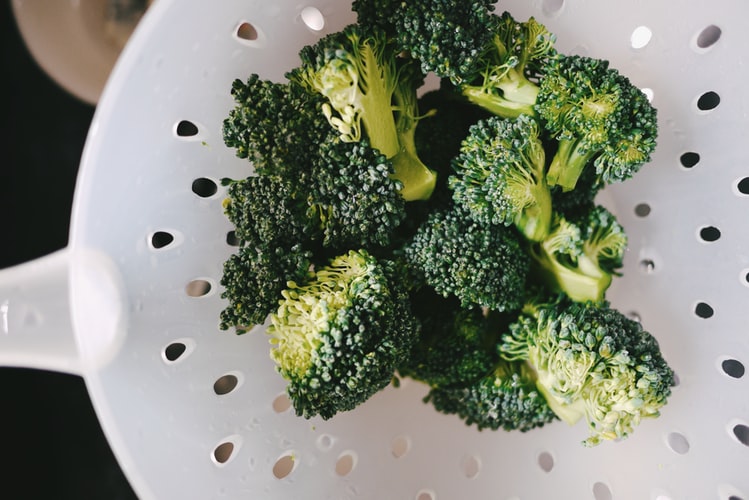Understanding the Difference Between Juice and Smoothie
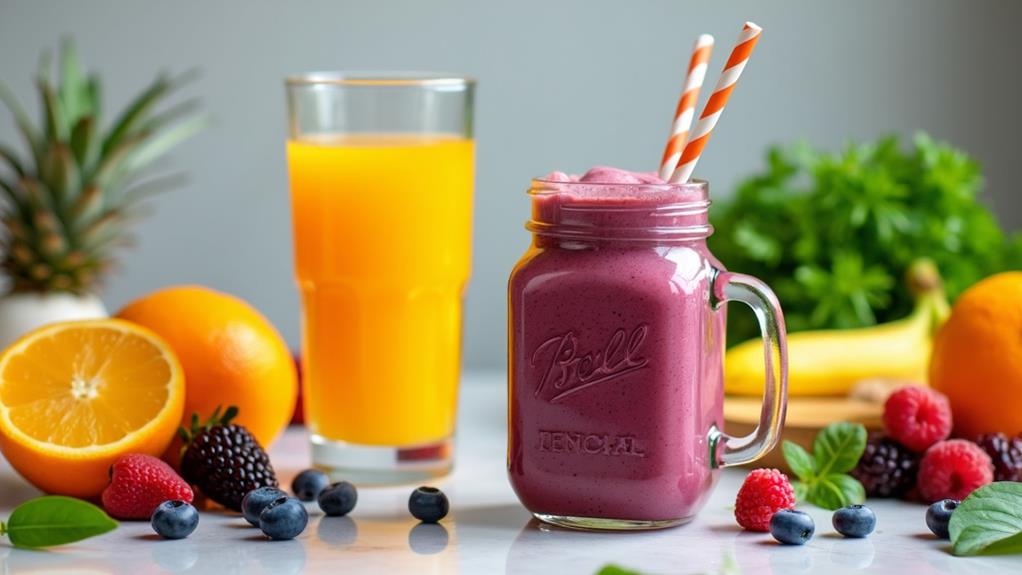
When choosing between juice and a smoothie, it's important to understand their fundamental differences. Juice is the liquid extracted from fruits and vegetables, removing the fiber but concentrating the vitamins and minerals. Conversely, smoothies blend whole ingredients, retaining the fiber and offering a more balanced nutrient profile. This difference impacts fullness, nutrient absorption, and overall health. So, how do you decide which option is best for your needs?
Definitions and Characteristics
When comparing juice and smoothies, it's essential to understand their distinct definitions and characteristics. Juice is the liquid extracted from fruits and vegetables, removing the pulp and fiber, and resulting in a thin, nutrient-rich liquid. While juice is rich in vitamins and minerals, it lacks fiber and macronutrients like protein and fat. The absence of fiber means juice often has a higher concentration of sugar, which can affect blood sugar levels.
Conversely, smoothies are blended mixtures of whole fruits and vegetables, retaining all the fiber and essential nutrients. This inclusion of the entire ingredient gives smoothies a thicker texture. The fiber content aids digestion and helps you feel fuller for longer, providing additional health benefits that juice cannot offer. Smoothies can also include other ingredients such as yogurt or seeds, adding protein and fat, which enhance their nutritional profile.
Nutritional Differences
When comparing juices and smoothies, significant differences emerge in fiber content, sugar absorption, and overall nutritional benefits. Juices lack fiber, leading to rapid sugar absorption and potential spikes in blood sugar levels. In contrast, smoothies retain fiber, which promotes satiety, supports digestive health, and contributes to a healthy gut microbiome. Additionally, smoothies tend to offer a more balanced nutrient intake due to the inclusion of supplementary ingredients such as nuts and seeds.
Fiber Content Comparison
Have you ever wondered why smoothies often leave you feeling fuller than juices? The secret lies in the fiber content. Smoothies retain the fiber from whole fruits and vegetables, which significantly impacts digestion and overall health. Here's how:
- Digestion: The fiber in smoothies slows down digestion, helping you feel fuller for longer periods. This gradual digestion also aids in maintaining stable blood sugar levels, crucial for managing diabetes and sustaining energy.
- Gut Health: Fiber supports a healthy gut by nourishing beneficial bacteria, enhancing your microbiome's diversity. This can improve digestion and promote regular bowel movements.
- Nutritional Benefits: Smoothies contain 3-5 grams of fiber per serving, supporting healthy eating habits. In contrast, juices usually have less than 1 gram of fiber, leading to quicker sugar absorption and fewer digestive benefits.
Sugar and Calories
Juices and smoothies vary significantly in sugar and calorie content, influencing dietary choices. Juices typically have higher sugar levels due to fiber removal during extraction, leading to faster sugar absorption and potential blood sugar spikes. In contrast, smoothies retain the fiber from whole fruits and vegetables, helping to regulate blood sugar levels by slowing digestion.
An 8-ounce serving of juice can contain around 24 grams of sugar, while smoothies generally have 15-20 grams, depending on added ingredients. This difference can impact overall health, particularly for those mindful of blood sugar management.
Calorie content also differs. Juices average about 100 calories per 8-ounce serving, whereas smoothies can range from 200 to 400 calories or more due to added ingredients like nuts, seeds, or dairy. While smoothies' higher calorie content may be beneficial for a more filling option, it's important to consider your dietary needs and goals.
Choosing between juices and smoothies can significantly affect your health, so select the option that best aligns with your nutritional requirements.
Antioxidants and Gut Health
Smoothies offer a myriad of nutritional benefits that extend beyond just supplying essential vitamins and minerals. They preserve the fiber from whole fruits and vegetables, which is crucial for maintaining gut health. This fiber not only promotes regular bowel movements but also enhances the absorption of antioxidants, making them more effective in combating oxidative stress.
Here are three key benefits of smoothies over juices:
- Enhanced Gut Health: The fiber in smoothies supports the diversity of your gut microbiome, aiding in toxin elimination and overall digestive health.
- Improved Antioxidant Absorption: With intact plant cell walls, antioxidants in smoothies are more readily absorbed, maximizing their beneficial effects.
- Balanced Nutrient Intake: Including ingredients like leafy greens boosts both antioxidant levels and prebiotic properties, fostering a healthier gut environment.
In contrast, juices, while rich in concentrated antioxidants, lack fiber. This can lead to quicker sugar absorption and reduced beneficial effects on gut microbiota diversity. Without fiber, juices may not support regular bowel movements or efficient nutrient absorption as effectively as smoothies do. Therefore, if your goal is to improve gut health and optimize antioxidant intake, smoothies are the superior choice.
Health Benefits
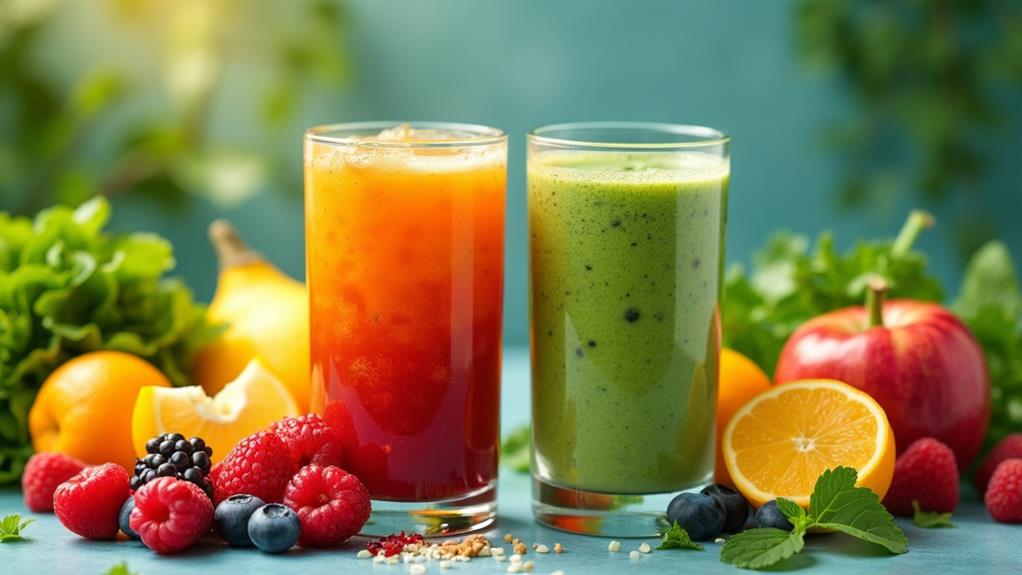
When comparing the health benefits of smoothies and juices, it's evident that smoothies have a nutritional advantage due to their fiber retention. This fiber is crucial for promoting digestive health and enhancing satiety. By retaining the fiber from whole fruits and vegetables, smoothies help regulate blood sugar levels, maintaining steady energy throughout the day. In contrast, juices can cause rapid spikes and drops in blood sugar, potentially leading to quicker hunger.
Smoothies also provide a versatile platform for incorporating supplementary ingredients like nuts, seeds, and protein powders. This customization allows for a balanced diet that supports muscle recovery and overall health. While juices offer a concentrated source of vitamins and antioxidants, they are less effective as meal replacements due to their low fiber content.
Regular consumption of both juice and smoothies can contribute to overall health, but smoothies generally come out on top due to their fiber retention and added nutrient density. Additionally, the fiber in smoothies supports a healthy gut microbiome, further enhancing well-being.
| Aspect | Smoothie Benefits | Juice Benefits |
|---|---|---|
| Fiber | Retains fiber, aids digestion | Lacks fiber, less satiety |
| Blood Sugar | Helps regulate levels | Can cause rapid spikes and drops |
| Customization | Supports balanced diet, muscle recovery | Quick hydration and nutrient intake |
Weight Management and Satiety
For effective weight management, consider how calorie density and fiber content influence satiety. Smoothies, which are high in fiber and protein, can help you feel full longer and curb overeating. In contrast, juices, with their high sugar content and lack of fiber, can lead to increased hunger shortly after consumption.
Calorie Density Comparison
Making calorie-conscious choices is essential for effective weight management. Understanding the calorie density differences between juices and smoothies can significantly impact your dietary decisions.
Juices: When juicing, the fiber from fruits and vegetables is removed, resulting in a lower-calorie drink. An 8-ounce serving of juice typically contains around 110-150 calories. However, the lack of fiber leads to quicker sugar absorption and may result in faster hunger and potential overeating, which isn't ideal for weight loss.
Smoothies: Smoothies retain the fiber from whole fruits and vegetables, resulting in higher calorie density but greater satiety. An 8-ounce serving of a smoothie ranges from 150-300 calories, depending on added ingredients like nuts or protein powder. The fiber content helps manage hunger by providing sustained energy and prolonged fullness.
Satiety Comparison: Smoothies help reduce total calorie intake by keeping you satisfied longer, while juices may increase hunger later in the day.
Fiber's Role in Fullness
Understanding the role of dietary fiber is essential for effective weight management. When you consume smoothies made from whole fruits and vegetables, you retain their natural fiber, which helps promote a feeling of fullness and reduces overall calorie intake. The fiber in smoothies also slows the digestion and absorption of sugars, preventing rapid spikes in blood sugar levels that can lead to increased hunger.
In contrast, juices often lack fiber, resulting in quicker hunger due to their concentrated sugar content, which may lead to overeating. High-fiber diets, including those from smoothies, enhance satiety and can reduce snacking, leading to lower caloric consumption over time. Choosing smoothies over juices can keep you full longer and aid in weight management.
Moreover, fiber-rich smoothies support healthy digestion and regular bowel movements, further benefiting weight control. Avoiding added sugars in your smoothies can significantly help you achieve your health goals. While both juices and smoothies have their place, smoothies offer more benefits for fullness and weight control due to their fiber content.
When to Choose Each Option
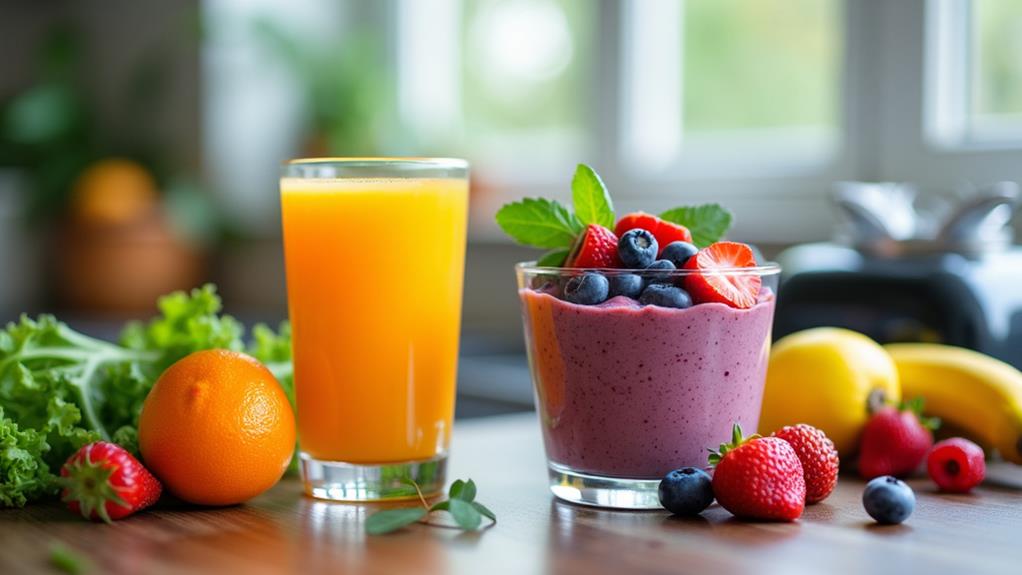
Choosing between juice and a smoothie can be straightforward if you consider your specific needs and circumstances. Here are key points to help you decide:
- Energy Levels: If you need a quick energy boost, juice is your go-to. Juices provide concentrated micronutrients that can recharge you instantly.
- Hunger: If you feel very hungry, choose a smoothie. Smoothies are packed with fiber and protein, helping you feel fuller for longer and serving as a meal or substantial snack.
- Digestive Health: For promoting regularity and preventing digestive issues, smoothies are superior. The fiber in smoothies can improve gut health.
Juices are ideal when you're not very hungry but need quick hydration and nutrient absorption, making them perfect for a detox or reset. On the other hand, smoothies are great for customizing with nuts, seeds, or protein powders to meet specific health goals. The fiber in smoothies helps promote regularity and prevent digestive problems, making them a better choice for comprehensive digestive health than juices. Choose wisely based on your immediate needs and health objectives.
Customization Options
One of the greatest advantages of smoothies is their incredible versatility. Smoothies can be tailored to meet specific health goals and dietary preferences, offering a wide array of customization options. Adding fruits, vegetables, nuts, seeds, and protein powders allows you to enhance their nutritional profile and cater to specific dietary needs.
For instance, if you aim to boost energy levels or support muscle recovery, incorporating superfoods like spirulina or protein powder can be highly effective. To include healthy fats, consider adding avocado or chia seeds. These ingredients not only provide essential nutrients but also promote a balanced diet.
For improved digestion and a diverse microbiome, ingredients like spinach or yogurt are excellent choices, as they nurture beneficial gut bacteria. The liquid base of smoothies offers endless customization options—whether you prefer almond milk, coconut water, or yogurt, you can adjust the thickness and creaminess to your liking.
Unlike juices, which have limited mixing capabilities, smoothies can blend a diverse array of flavors and nutrients, making each sip a personalized experience.
Nutrient Absorption
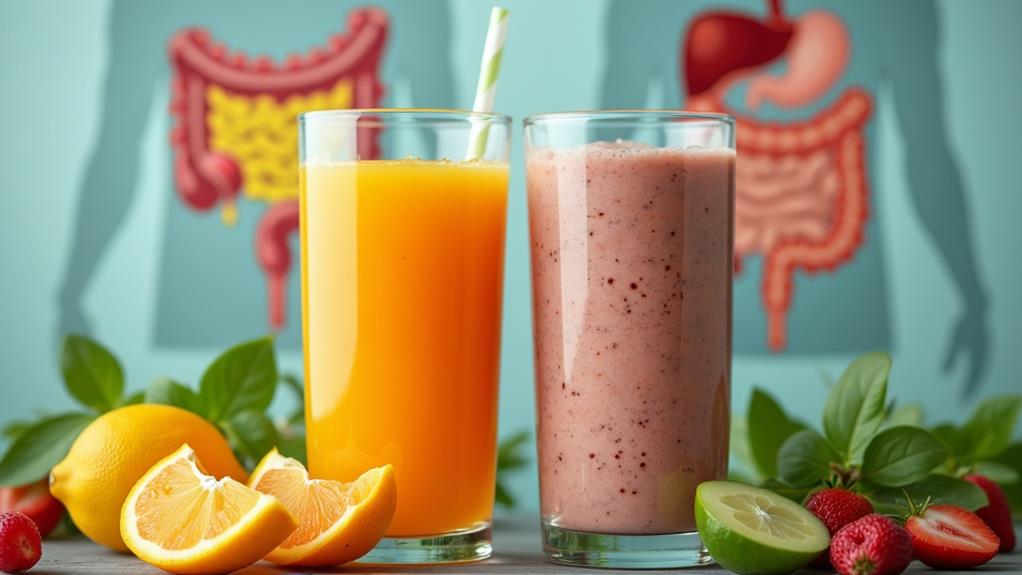
Smoothies provide a notable advantage over juices in terms of nutrient absorption. The blending process used to make smoothies breaks down the cell walls of fruits and vegetables, enhancing the bioavailability of their nutrients. This makes essential vitamins, minerals, and antioxidants more accessible for your body to absorb.
One significant benefit is the retention of fiber in smoothies, which slows digestion and allows for a more gradual release of nutrients. This helps maintain steady energy levels, unlike juices that can cause rapid spikes in blood sugar due to the lack of fiber. Key points to consider include:
- Bioavailability: Smoothies enhance the bioavailability of antioxidants, vitamins, and minerals, ensuring efficient nutrient utilization by your body.
- Fiber Retention: The fiber in smoothies supports gut health, improving nutrient absorption and overall digestive efficiency.
- Steady Energy: Fiber slows the release of nutrients, preventing rapid blood sugar spikes and providing sustained energy.
In the discussion between juicing and smoothies, it's important to note that while juices are nutrient-dense, they lack the fiber necessary for optimal nutrient absorption and gut health. Smoothies offer a more balanced nutrient profile and sustained energy, making them a superior option for nutrient absorption.



